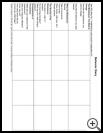
Ignoring Instructions
Not Coming When Called
- Example
This condition is also called "parent deafness" or "tuning out the parents." This behavior occurs when children don't want to listen or follow through with a parent's suggestion. A child does not need his hearing tested if the "deafness" only occurs in selected circumstances.
- The rule
"Listen to what I say, because I'll only tell you once."
- Discipline technique
If you have something important to tell your child, go to her and elicit eye contact before giving your instruction. If she doesn't follow through, use logical consequences, such as cold food for getting to dinner late.
- Praise
Praise your child for coming when called.
- Model
Don't shout from another room. Don't give lectures or commands. Listen carefully to your child and respond promptly. Stop giving repeated reminders.
Not Coming Home on Time
- The rule
"Come home on time."
- Discipline technique
Logical consequences such as grounding for one day or having your child come home earlier in the future.
- Praise
Praise your child for meeting deadlines.
- Model
Be punctual.
Not Getting Ready to Go Somewhere on Time
- The rule
"Don't be late when we have to go somewhere."
- Discipline technique
Give your child some lead time. If the activity is not essential, have your child miss that activity. If the activity is important, use manual guidance to interrupt your child's dawdling.
- Praise
Praise your child for being ready on time.
- Model
Don't make your child wait for you. Show your child how you get ready in a hurry.
Procrastinating about Washing, Bathing, or Toothbrushing
- The rule
"We wash our hands before meals. We have a clean face and smell good before going places. We brush our teeth after meals and before bed."
- Discipline technique
Logical consequences: Your child is not allowed to have his dinner until he has washed his hands. Your child is not allowed to go to school until he is clean, even if this means he will be late for school. You decide whether or not his body or teeth are clean enough, by doing a recheck after your child has had an opportunity to brush his teeth or wash again. For infants, use more distraction (such as storytelling) and enthusiasm to make your child feel positive about the cleaning process.
- Praise
Praise your child for spontaneously brushing teeth or washing. Also compliment him on how he looks and smells afterward.
- Model
Have good hygiene habits yourself.
Last modified: 2002-03-25
Last reviewed: 2016-06-01

